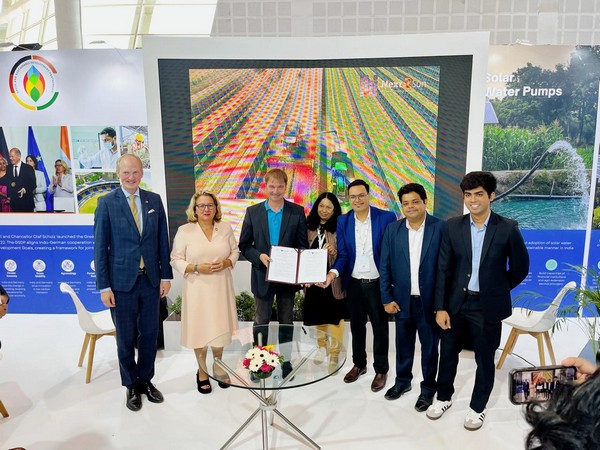AgriVijay, Next2Sun Germany and Wattkraft India Join Forces for Revolutionary Renewable Energy Initiative
A groundbreaking MoU was signed at RE-INVEST 2024 between AgriVijay, Next2Sun Germany, and Wattkraft India. The collaboration introduces vertical solar technology to generate clean energy while enabling continued farming, addressing the challenge of land usage in traditional solar installations and promoting India's energy independence.

- Country:
- India
In a landmark move, AgriVijay, Next2Sun Germany, and Wattkraft India inked an MoU during the RE-INVEST 2024 event in Gujarat, aimed at transforming the renewable energy and agricultural sectors. The 4th RE-INVEST Global Renewable Energy Meet and Expo was hosted by the Ministry of New and Renewable Energy (MNRE).
The partnership brings innovative vertical solar technology that promises to revolutionize both energy generation and agriculture. This dual-use approach allows for farming on the same land as solar panels, addressing land usage issues while promoting energy independence and climate action in India.
Addressing the MoU signing, AgriVijay's CEO, Vimal Panjwani, emphasized the benefits of Next2Sun's vertical bifacial Agri-PV systems. "By enabling dual land use, farmers can continue agricultural activities while generating renewable energy," Panjwani said. Pilot projects will be launched across India, with support from both Indian and German governments, for potential nationwide adoption.
The partnership comes at a critical juncture as India looks for innovative ways to meet its energy demands without sacrificing agricultural productivity. Vertical bifacial solar technology enables energy generation while allowing crop cultivation below the panels.
Prominent dignitaries, including Sascha Krause-Tunker from Next2Sun AG and German Minister Svenja Schulze, witnessed the MoU signing. They highlighted the potential of this collaboration to set new benchmarks in sustainable development and energy production in India.
India reaffirmed its renewable energy commitments at COP26, aiming for 500 GW of non-fossil electricity capacity, and a 45% reduction in emissions intensity by 2030. The adoption of renewable energy sources is pivotal for reducing dependence on fossil fuels and achieving net-zero emissions by 2070.
(With inputs from agencies.)
ALSO READ
India's Rapid Renewable Energy Growth Poised to Boost Economy
Poland's Ambitious Renewable Energy Goals for 2030
Germany-India Collaboration: Financing the Renewable Energy Revolution
Strengthening Ties: India and Germany's Shared Commitment to Renewable Energy
East Timor's Renewable Energy Transformation Amid Economic Struggles










